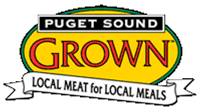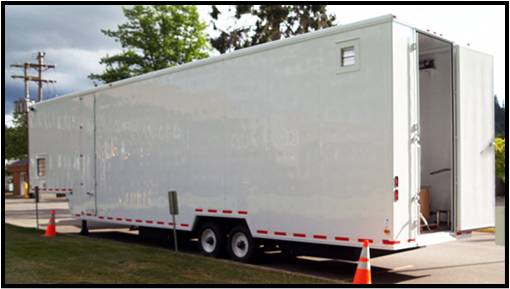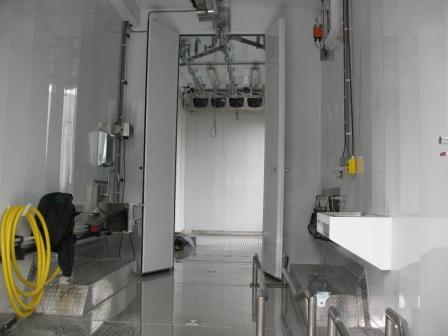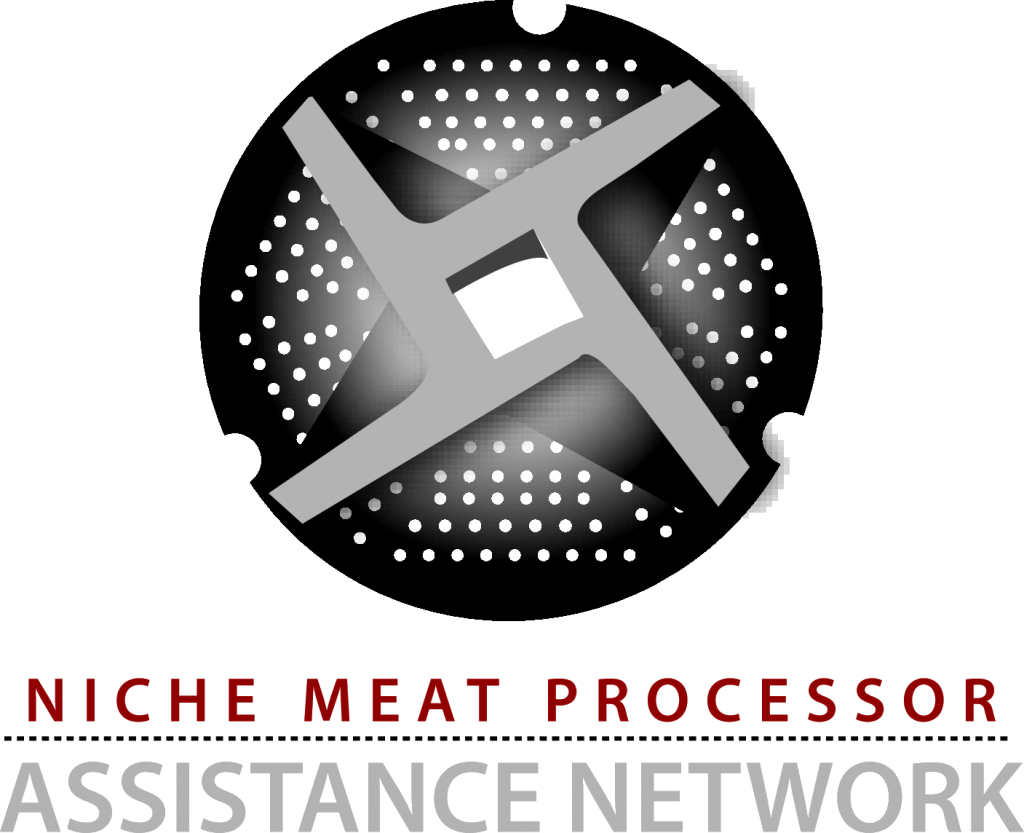Update: January 2021
PSMPC is no longer in business. The unit is being operated by Heritage Meats and is parked in one location.
All information below is from 2013.
As of Sept.2013, the PSMPC MSU is still going strong. From their member newsletter “Year to date, the PSMPC has processed 266 beef, 156 pigs, 129 sheep, and 17 goats. These carcasses totaled over 219,000 pounds of meat with an estimated total value exceeding $750,000 dollars to PSMPC producer members and customers.
The Puget Sound Meat Producers Cooperative (PSMPC) is a non-profit cooperative of local ranchers, farmers, butchers, restaurant owners and others. PSMPC operates a mobile, USDA-inspected red meat slaughter unit initially servicing King, Kitsap, Lewis, Mason, Pierce, and Thurston counties, in Western Washington. The MSU began inspected operations in fall 2009.
The MSU is operated, on a contract basis, by a local livestock producer and founding PSMPC member who also has his own custom-exempt/retail-exempt butcher shop. Carcasses requiring USDA inspected cut-and-wrap are taken to two inspected plants in the region: Minder Meats in Bremerton and Heritage Meats in Rochester. Other custom-exempt/retail-exempt butchers also use the MSU to have inspected carcasses they can cut up and sell from their own retail counters.
As of spring 2012, the MSU travels between two slaughter sites, one used weekly and one used every other week, though the frequency is expected to ramp up in late summer and fall to as many as 4 days/week. Use is gradually increasing; in 2010, the first full year of operations, 516 animals (beef, sheep, pigs, and goats) were processed. In 2011, this had risen to 850.
Basic information
Capacity per day: 8-10 animal units per day (1 cow, 2 pigs, 3 three sheep/goats = 1 animal unit).
Hours/day of operation: up to 8 under inspection (including a 30 minute pre-inspection), extra for set-up, clean-up, and transportation.
Days/week: As needed, based on demand
Weeks/year: As needed, based on demand; currently estimating 90 processing days in 2012
Species: Cattle, sheep, pigs, and goats
Services: Slaughter and delivery of carcasses to cut and wrap facility
Square feet: Trailer is 45′ long.
#/type of employees: PSMPC has no employees. The MSU is operated on a contract basis by a lead butcher (see above) with one assistant (more when needed), who handles the paperwork. PSMPC board members handle scheduling and bookkeeping on a volunteer basis.
Annual revenues: In 2011, the co-op had net income of ~$11,000 (after paying the butcher and covering operational & maintenance expenses).
Price of services:
- Members: beef = $110; pigs = $70; sheep/goats = $50
- Non-members: beef = $140; pigs = $90; sheep/goats = $70
- Extra charge for cattle older than 30 months
- Extra charge for pigs >275 lbs and sheep/goats >100 lbs
- Mileage, disposal, stall, toll, and other fees may also apply
Capital (start-up) costs: $500,000 (est.) for trailer, training necessary for employees, operating capital, and tool purchase.
Operational costs: $57,000 in 2011
Retail on-site: No
Wholesale: No
Inspection: USDA-inspected; can also do custom-exempt
Certified organic: Yes
Certification agency: Washington State Department of Agriculture
Custom work: Yes
History and development
Over the past twenty years the Southern Puget Sound Area of Washington state has lost all USDA-inspected slaughter facilities for large animals. At an agricultural summit in Enumclaw, WA, in November 2007, area producers identified this loss as a key barrier to viable livestock farming.
Driven by the determination of producer Cheryl Ouellette (who served as the Cooperative’s first President), and with support of the Pierce County Farm Board, the Pierce Conservation District, and other local organizations, a group of producers formed the Puget Sound Meat Producers’ Cooperative in February 2008. In June 2008, the Pierce Conservation District board of Directors approved funding for a mobile processing unit (MPU). Their decision rested in large part on a feasibility study, “An Assessment of Demand for a Mobile Slaughtering Unit in Pierce, King, Kitsap and Thurston Counties, for the Puget Sound Meat Producers Cooperative”, prepared by Georgine Yorgey, then an MPA student at University of Washington.
PSMPC ordered the unit from TriVan. By November 2008, PSMPC had finalized the MSU design and began to offer membership shares. In June 2009, the MSU was delivered, and the USDA grant of inspection and WSDA Organic certification were received two months later. The first animals were slaughtered in the unit on October 2009.
The MSU is owned by the Pierce Conservation District, leased by the Puget Sound Meat Producers Cooperative, and operated by a PSMPC member on a contract basis. Originally, PSMPC had paid staff to manage and operate the unit, but this proved financially unsustainable.
Funding sources and start-up costs
The capital for the MPU was made available through the Pierce Conservation District in Pierce County Washington. The District itself took out a loan for part of the necessary capital. The funding covered these costs:
- Trailer: $250,000
- Equipment: $12,000
- Design/initial management of project: $35,000
- Outreach: $30,000/yr
- Employees: $70/hr
- Lease cost of truck
Business plan
The PSMPC business plan was designed with input from a variety of Puget Sound area agricultural experts that include livestock producers, butchers, a certified business advisor, lawyer, and non-profit agencies. Since its inception, PSMPC has monitored operating costs and adjusted the business model. The unit’s long term financial viability depends on increasing PSMPC membership as well as MSU use by non-members.
Deciphering regulations and complying
The PSMPC MSU was designed to be flexible for new compliance requirements and regulations. The unit can be retrofitted as regulations change. The MPU is USDA and WSDA (Organic and custom exempt) inspected and therefore is compliant with these various regulations.
Plant design and equipment
The design team, which included 3 butchers, 2 cut and wrap operators, and Cheryl Ouellette, supplied requirements to TriVan. Input was sought from other MSU operators within the state of Washington including Bruce Dunlop of Island Grown Farmers Cooperative.
The unit is equipped with a diesel generator, water storage, hot water heater, refrigeration, and tools to allow for fully self-contained operation. It also has a backup system for hot water and water filtration.
Staff needed, how they were found and trained, and what they cost
Originally, PSMPC had nearly a half-dozen paid staff, including an overall manager, a site coordinator/overseer, a lead butcher, and several assistants. This did not prove sustainable, because of less-than-anticipated throughput and revenue.
By 2010, PSMPC no longer had employees and had entered into a contract with a butcher, also a PSMPC member, to operate the unit. He receives a daily and per-head rate. The butcher typically has one assistant, who coordinates with USDA and handles regulatory paperwork; the butcher hires other assistants as needed. PSMPC board members take care of scheduling and bookkeeping, all on a volunteer basis. Once the carcass is transported to the USDA-inspected cut and wrap facilities, those facilities take over.
Financial sustainability plan
Once initial funding was secured and the Cooperative formed, the unit itself did not require additional external funding. This is largely because (a) the Conservation District has been able to cover the payments on the loan it incurred to build the MSU so has not required more than a $1/year lease payment; and (b) the lead butcher has been willing to operate the MSU on a contract basis, as needed because he can incorporate the MSU into his existing processing business.
The contract butcher is paid a $300 daily rate (for set-up and transport) plus a fee per animal unit; the butcher pays his assistants and purchases all consumable supplies used with the MSU. Prices paid by producers, which are paid to PSMPC, include a margin for PSMPC to cover fixed costs, including maintenance, repairs, and equipment replacement; insurance; lab fees; legal fees/permits; and site improvements. PSMPC pays a lease fee to the Conservation District of only $1/year.
Markets accessed
The most common avenue for product sale is through direct marketing, at farmers’ markets and bulk (whole, half, quarter carcass) sales. In addition, several custom-exempt butcher shops use the MSU to slaughter their own animals or animals they purchase from local farmers and cut up and sell the meat through their retail-exempt meat counters. The MSU is being used for custom-exempt slaughter also.
Growth to Date
Since incorporating in 2009, the Co-op has grown to 57 voting members and 25 associate members. The Co-op ended 2010 with their financials in the positive and the 2011 budget forcasted a 62% increase in operations.
Challenges and Lessons Learned
Initially, PSMPC had to get through the complex task of getting many different interests on the same page, setting up the formal cooperative structure, and navigating the regulatory environment for USDA inspected slaughter, as well as local requirements.
Since start-up, PSMPC has had two critical challenges which together nearly led to bankruptcy and the end of the project. First, co-op membership and numbers of livestock processed by the MSU have both been dramatically lower than originally anticipated, based on the original feasibility study. Current co-op president Perry Schermerhorn estimates that in 2011 only 20% of the membership used the MSU regularly.
In part, this is because direct and wholesale meat marketing is difficult: many members did not have established markets and have had difficulty getting started or ramping up. It is also bad timing: Record high prices in conventional cattle markets mean that producers can sell live animals at auction for a very good return, without the work and expense associated with special production practices and marketing meat.
The second major challenge arose around co-op management and the significant cost to the co-op of having paid employees to manage the co-op and run the MSU. The result was a leadership transition and structural changes, primarily a shift to contract and volunteer labor, as described above. As MSU volume and revenue increase, the co-op hopes to begin paying for services, starting with bookkeeping
Selected media coverage
- “The Mobile Meat Processing Story” on CRCC TV-22
- “Slaughterhouse on Wheels Aids “Locavore” Movement” Seattle Times, 8-11-09





